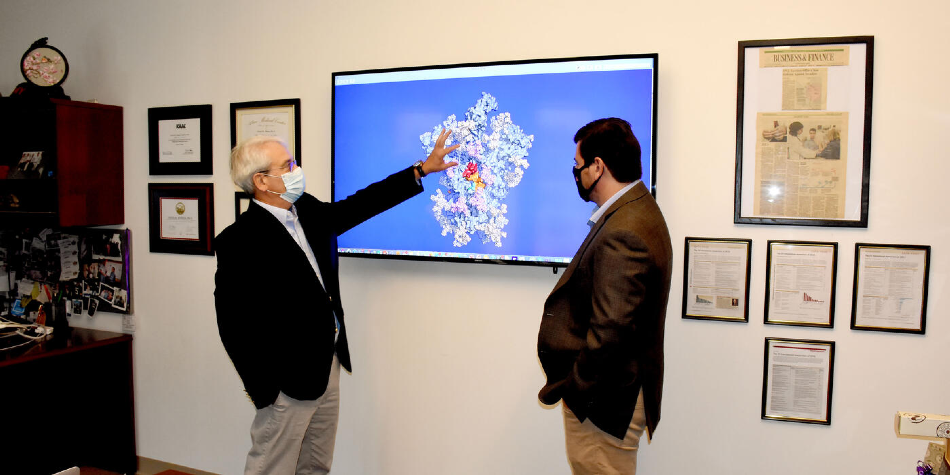Sep 11 2020
At the Wistar Institute, researchers merged synthetic DNA technology with their expertise in protein engineering to successfully create nanoparticle antitumor vaccines that stimulated strong CD8 T cell immunity and regulated melanoma growth in preclinical models.
 L-R: Wistar scientists Drs David Weiner & Dan Kulp. Image Credit: The Wistar Institute.
L-R: Wistar scientists Drs David Weiner & Dan Kulp. Image Credit: The Wistar Institute.
The findings of the study, which were reported online in Cancer Immunology Research, a journal of the American Association for Cancer Research, promote the exploration of this immunotherapy method for other cancer types.
Nanovaccines contain very small (nano) particles—similar to viruses and bacteria with respect to their size—utilized to exhibit several copies of an antigen and capable to evoke powerful immune responses. The researchers earlier reported about making use of DNA instructions to initiate in vivo production of nanoparticle vaccines (DLnano-vaccines).
Within the body, DLnano-vaccines generated powerful immune responses compared to protein-based nanoparticle vaccines in an infectious disease setting, particularly triggering CD8 T cell responses.
We wanted to test DLnano-vaccines for cancer immunotherapy and obtain proof of concept that this platform could be successfully applied in the cancer field, thanks to its effectiveness at prompting CD8 T cells responses.
Daniel Kulp, PhD, Study Corresponding Author and Associate Professor, Vaccine & Immunotherapy Center, The Wistar Institute
Kulp specializes in nanotechnology and protein engineering for vaccine development.
The CD8 T cells have the potential to particularly kill malignant cells and play a crucial role in anti-cancer immunity. Therefore, the use of such cells is an essential step for the success of anticancer vaccine methods, although this kind of immune response is normally challenging to realize by vaccination with inactivated viruses or proteins.
Scientists developed DLnano-vaccines exhibiting 60 copies of protein parts acquired from the melanoma-specific antigens Trp2 and Gp100 and tested these in mouse models of melanoma. In the tests, extended survival was observed and relied on CD8 T cell activation both in prophylactic and therapeutic settings.
One of the advantages of synthetic DNA technologies over other methods is the versatility of the platforms. DLnano-vaccines may be designed for various cancer targets and our study shows this is a promising strategy for cancer immunotherapy that may warrant further testing.
Ziyang Xu, PhD, Study First Author and Doctoral Graduate, The Wistar Institute
To interpret the mechanism used by the DLnano-vaccines to activate CD8 T cells, the researchers analyzed the impacts of the DNA-launched version of a previously explained HIV nanoparticle vaccine (eOD-GT8-60mer).
It was noted that DLnano-vaccines administered by electroporation caused transient muscle cell apoptosis that led to macrophage infiltration at the injection site, which was instrumental in triggering CD8 T cells.
DLnano-vaccines were developed with the help of synthetic DNA technology in collaboration with the laboratory of David B. Weiner, who holds a Ph.D. and is a Wistar executive vice president, director of the Vaccine & Immunotherapy Center, and the W.W. Smith Charitable Trust Professor in Cancer Research, as well as a co-senior author of the study.
Co-authors of the study include Neethu Chokkalingam, Edgar Tello-Ruiz, Mamadou A. Bah, Susanne Walker, and Nicholas J. Tursi from Wistar; Megan C. Wise, Paul D. Fisher, Katherine Schultheis, Kate E. Broderick, and Laurent Humeau from Inovio Pharmaceuticals, Inc.
The study was financially supported by the National Institutes of Health (NIH) grants U19 Al109646 and Collaborative Influenza Vaccine Innovation Centers (CIVICs) contract 75N93019C00051. Additional support was offered by Inovio Pharmaceuticals, Inc., a grant from the W.W. Smith Charitable Trust, and the Monica H.M. Shander Memorial Fellowship.
Journal Reference
Xu, Z., et al. (2020) A DNA-launched nanoparticle vaccine elicits CD8+ T-cell immunity to promote in vivo tumor control. Cancer Immunology Research. doi.org/10.1158/2326-6066.CIR-20-0061.
Source: https://wistar.org/